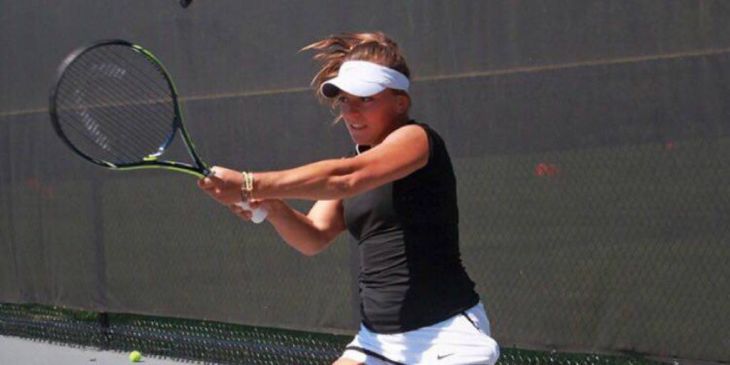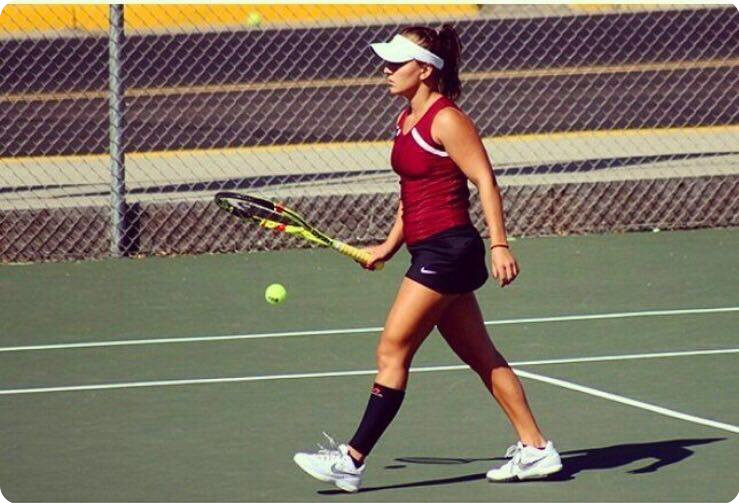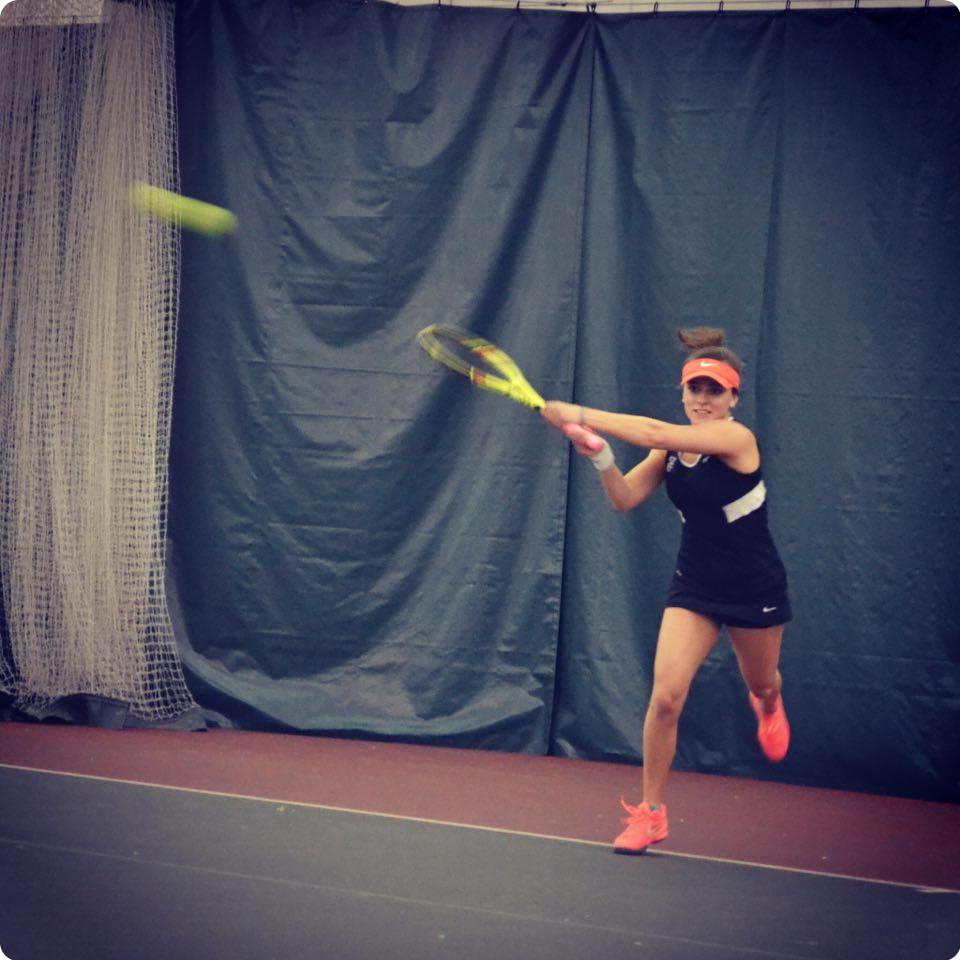When You Play College Tennis It's All About The Team

Date of the interview: June 17, 2017
Stephanie, you graduated with the best win percentage ever recorded by a Greyhound and you were named ITA All American in 2015 as the second player in program history. How do you feel about these achievements?
I'm very proud of that. Before I went to the US I didn't know what the level was like. I mean I practiced very hard and then my goal was of course to become one of the best. I think I did a great job; it's an honor for me. The whole university, they recognized they were proud of me and my achievements. I'm happy about it!
You had a very strong last season, but have you also had some tough times during your college time?
Yes, my freshman year, I was not eligible. I was happy given the circumstances, because the school fully supported me, even though I was not eligible! The second week - I was not eligible to play - I called my dad and said "I'm going to quit, I can't stand it."
In my second semester of my freshman year, I got ill - I got mono. So I couldn't even go to school, I was in bed for three months, it was terrible. But my family supported me and I went through this.
The second year, my sophomore year, I was able to play and from then on this semester was great. The next semester, we had a great season, we qualified for the Nationals, for the Sweet 16, which was amazing for the school.
My junior year I got injured in the second semester. I had a hip surgery, so that was another setback. I mean, I had a lot of ups and downs, but I learnt a lot and I think that's what made me stronger as a person. It was not easy, but I had great team mates, they supported me and my family supported me!
That's great to hear! Did you take the surgery in the US or in Europe?
Yeah, I took it in the US. I got injured in October at practice. I was falling down when I was playing a drill and the doctors didn't know what I had so I took a 2-week break and then I still had pain. Then I went to see another doctor in the US, one of the best doctors specialized in hip injuries in the North and he told me I might need to have a surgery, but he was not sure. So I went back home to talk to an Austrian doctor, but he wasn't sure either. I got back to the US in January and the doctor asked me if I wanted to play professionally and of course I wanted to play and compete. That's why I had the surgery and I decided to do it. In the end, the result was that I had torn my labrum and it was really bad and the surgery was the only way to heal it. It took me almost a year to heal 100%.
You mentioned "playing professionally": before you went to the US, you did have quite some success on the ITF and WTA tour as well. What were your thoughts prior to deciding to go to college? Was going professional an option?
Yes honestly, I wanted to go professional and I wanted to play, but then my dad, he brought up me playing college tennis, go to the US - and I was not really happy about it in the first place. Now looking back, I'm more than happy I took that decision. But yes, I wanted to go pro, I wanted to play, travel. If I think about it right now, I'm happy I didn't do it. I can't see myself travel the whole year, because it's so expensive. For me it was the mental part, why I didn't make it that far before. I put too much pressure on myself, because I knew it's so expensive. Now I'm happy I went to the US and I did not choose the professional way.
Was it still an option after your time at college or did you decide it was not an option to go pro ever?
When I went I was like "OK, I can go study for four years and when I come back, I can go pro". I kept that option alive, but then after these years passed by I was like "no, I'm fine like that and I want to work afterwards."
Was it your dad who made you aware of the opportunity to play college tennis? How else did you first hear of it?
First time I heard, I think it was from Domi Wimmer, a friend of mine, and she actually helped me a lot. I heard it from a lot of people and the coaches, they always contact you to make you come to the US. A lot of coaches came to the tournaments, they talked to me and that's how I heard about it. And then my dad said, "Hey maybe you should do that", and he pushed me a little bit.
Can you tell us a little more about your scholarship package?
I had a full-ride scholarship.
How did you get in touch with the coaching staff at Indianapolis?
That was quite funny, actually. I don't know 100% how I came to end up in Indiana, at the University of Indianapolis. I spoke to a lot of people, but then I found out that I was not eligible; neither for D1 nor for D2. And then I talked to several coaches and the last coach that I spoke with, he had a connection to Malik Tabet, my coach at the University of Indianapolis. They were good friends, and he was like: "Hey, look at this girl!", and that's how I got in touch with my coach.

That's brilliant! You mentioned the eligibility issue that you had. Tell us a little more about that - what was the problem?
The problem was that I went to a five-year (high) school back home. They thought, "OK, why did you go to high school for five years?" So that was one problem. Then, I played professionally, I earned too much money, which makes no sense. And another reason was that I did not enrol right after I graduated from high school. I decided to go after one year, so that was another problem. I was too old or something like that.
So the NCAA charged you with one season of eligibility?
Yes, but then after I had the surgery, I was a redshirt junior. So I actually have one more year of eligibility, but I said I'm done with school and I'm not getting any younger, my body doesn't get any younger. I mean I was a little worried about my hip and I didn't want to play one more year on hard court every day, so I decided to go back and that was the right decision for sure.
You ended up having three seasons of eligibility, did you have other interesting options in terms of colleges or was that basically your last resort in Indianapolis?
It was kind of my last one, because the time was so short. I think I signed the contract in July and I was set to start in August, so that was kind of a tight timeline. And because I didn't want to go initially, I didn't really look into it too much, honestly!
It did work out fine in the end, right? You mentioned you wanted to go pro before deciding for college. Had you not gone to college, do you think you would have tried it on the pro tour?
Of course I would have played professionally probably, but I don't know how far I would have got. Then I would have probably started college in Vienna (Austria) and given some lessons on the side, making some money. I would not have had the opportunity I had over in the US and I would not have played that competitively in combination with studying - that's not possible in Europe.
We spoke about the fact that it was a D2 school. Was that an issue for you, something that you cared about? How would you compare the level between D2 and D1 schools in women's tennis?
Before I arrived there, I thought "OK I'm playing at a D2 school, that's embarrassing, that's a bad level!" and I wasn't very happy about it. But then I went there and I saw the level and we played against really good schools. We played against Barry - the girl I played against she was WTA #400; the level was really good.
We also played against a lot of D1 schools for pre-season and we beat them. It's just the size of the university that is the difference and not necessarily the level of competition and the level of players.
What was the best ranking of the team during your time at the UIndy?
That was this season. We ended up being #13 in the nation.
How was your conference in total, how would you compare it?
We were # 1 in the conference, #1 in our region. I think our conference level was not that great. We had one or two tougher teams, but I had no doubt that we're not gonna win the conference or regionals. Speaking of the conference: it was our final match against Drury and it was 4-4, third set and I played the last match. Everybody was watching, my serve and I was shaking. We won it funnily - I won 6/4 in the 3rd set.
Great job! We haven't spoken about what you actually studied. What was your major?
I studied Sports Marketing.
How pleased were you with that program in general?
I think it was great. We had a lot of opportunities to work with professional teams, for example the Pacers, Indianapolis Colts, Indy Eleven, and I met some quite important people there. I mean that was cool. You get in touch with some professional people and you learn a lot about your major and what you can do in that field. It was cool!

It's pretty obvious you want to remain active within the sports universe. How about you as a tennis player? Are you a better player today than 4 years ago?
Yes, I think I got more patient. My serve did not really improve. I think, there is no coach on this planet who can fix my serve. No, I think I got more patient and also more quiet on the court, because 4 years ago I was throwing my racket. I still do that sometimes, but not that crazy. I'm fighting more, I have the spirit, I think that improved. And now coming back, I play club matches in Austria and I'm the team captain for my team. I think I'm more of a team player and I really care about my team mates. I'm pushing them and I'm so passionate about it! I think that's a huge improvement and it's more fun for me to play now!
I took the time to have a look at your profile on the ITF- website, and it says your favorite surface is clay. Is that still the case?
Yes, I love clay. I think that is the real tennis game: grinding, fighting, getting dirty. Maybe for my playing style, hard court might be better - but no, I like clay courts more! I grew up on clay.
How about life on campus? Did you stay on campus/off campus? Tell us a little about your experience in Indianapolis!
I lived all four years on campus. My freshman year, I was in a freshman dorm, I think it's the same everywhere. That was funny, one of my team mates helped me carry my suitcases and I went into my room and I was turning around and I said: "Where is the bathroom?" And she said, "Well, it's outside!" I wasn't expecting that we would be sharing the bathroom with the whole floor. That was an interesting year, sharing the room with a random person that I have never seen in my life before, but I was real lucky - she was super nice! She was not an athlete, but what's really funny is that I made her work out and now she is a "fitness workaholic".
You can pat yourself on the shoulder for that one!
Yeah, I'm really proud of that! And for the last 3 years I stayed in a dorm by myself; that was really nice. Living on campus, I think you get the whole college experience. Sometimes, I thought about moving in with my teammates, but I never did.
How about the student body? Were there a lot of Internationals, a lot of American students? Tell us a little about the atmosphere!
A lot of Internationals. The men's team in the last semester, they were only Internationals. And in the women's team we had 4 out 10 Americans. It was great, you learn a lot. Your horizon gets much bigger. No, it was great because of the different approaches of how you look at things. I learnt a lot! It was cool!
What is your biggest takeaway of your time in the US?
For sure the friends I made. I have friends now across the whole world. Also, the team spirit. You know, tennis is a sport you play for your yourself, normally. But this is a different sport when you go to college. When you play college tennis it's all about the team and that is huge. I will never forget that time. Being in a team, even though you are an individual athlete, is great.
We couldn't agree more! Is that also one of the reasons why you would recommend players to go to college? More generally, why would you recommend playing collegiate tennis?
Because you learn a lot. You learn to live by yourself. You cannot always call your dad or you family and say: "Hi, I need this and that". You need to figure it out by yourself. You get more mature, you get to know so many different people from all over the world. That's one of the biggest things I would say. You can always turn pro during or afterwards. In the breaks, you can play some professional tournaments, get some points, and afterwards you can play professionally if you want. You have great practices, great opportunities to develop there, get some experience and then you can always decide which way you're gonna go afterwards.
What are your plans now that you're done?
I'm not quite sure yet. I probably want to go to grad school and work at the same time. It's not a full-time grad school, so I can work and give some lessons. I want to stay within sports, maybe coaching, fitness coaching.
And finally, what is the best experience or single memory of your college time that you will take home with you?
One of the best memories, maybe because it's still fresh, like I mentioned before, I was clinching the conference title. The whole team was running towards me, jumping up and down after the match point. I think that's why you go and play college tennis to have these memories.
Stephanie, thank you for the interview.
Are you ready to live the dream the way Stephanie did? Check out what we have in store for you on Smarthlete, sign up with a free recruiting profile and start talking to coaches already today! Feel free to drop us a line at contact@smarthlete.com, in case you have any questions!